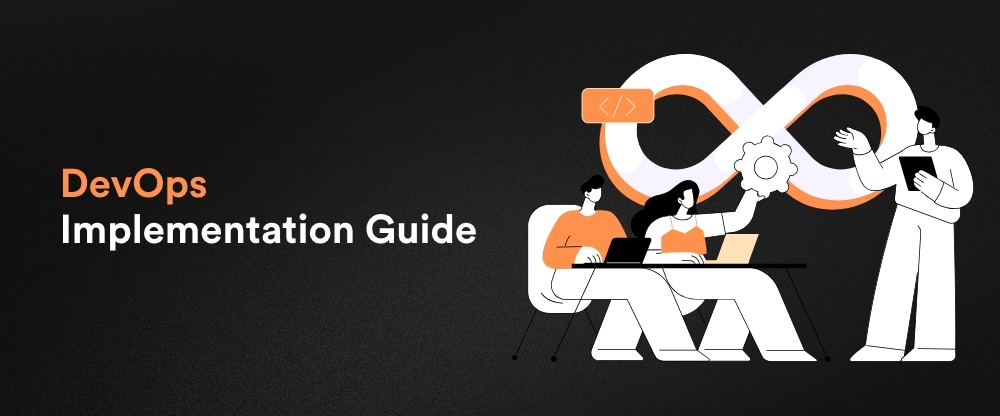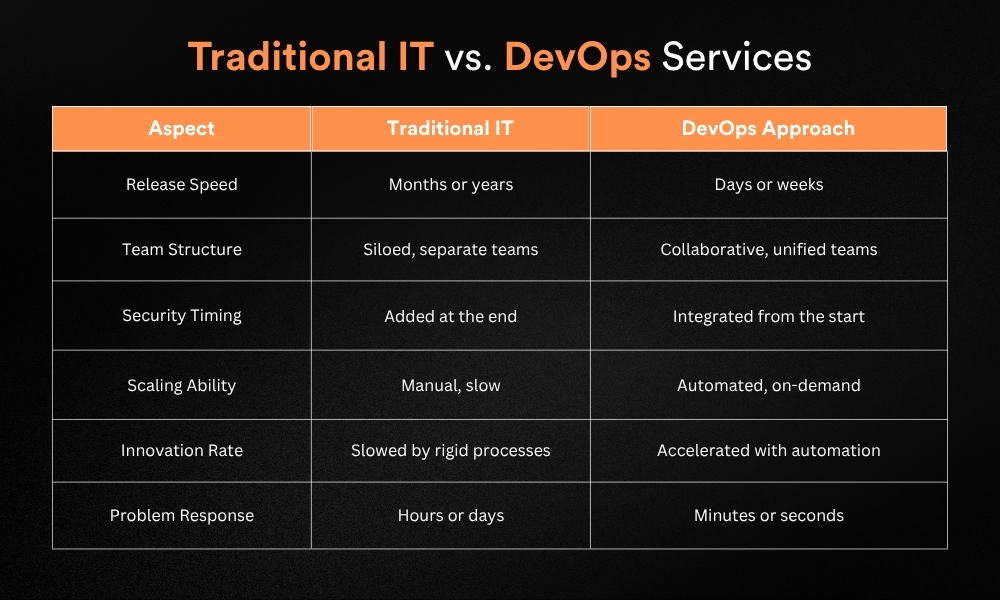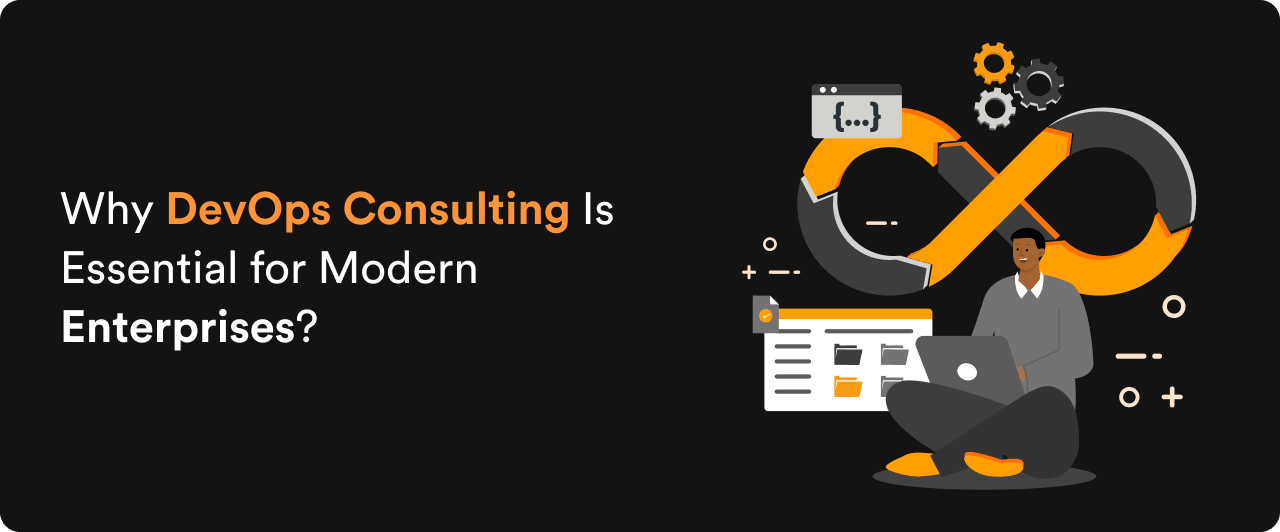
With DevOps, development and operations stop working in separate corners. They collaborate on the same goals. Traditional software delivery hits constant roadblocks. One team finishes their part and waits. DevOps removes those delays.
The numbers tell the story. Australia’s DevOps market hit USD 263.2 million in 2024. By 2033, it’s expected to reach USD 1,356.0 Million. That’s a 19.98% annual growth rate. Organisations everywhere are catching on.
This blog describes DevOps implementation and how DevOps consulting services can help.
What is DevOps and Why Does It Matter?
DevOps combines development and operations into one integrated process. Instead of developers just delivering code to operations, everyone works together as a team. The entire software lifecycle becomes collaborative. Implementing DevOps makes a real difference:
- 65% of businesses deliver higher-quality software.
- 52% recover faster when issues happen.
- 48% create better products and services.
- 45% see fewer failures in new releases.
A DevOps consulting company can guide the transition from a traditional approach to this holistic system. They help avoid costly mistakes.
Signs Your Business is Ready for DevOps
Not sure if DevOps fits your situation? Look for these red flags.
- Delivery keeps getting stuck: Projects move slowly through approval chains and manual handoffs. What should take days stretches into weeks.
- Production keeps breaking: Bugs appear after launch. Rollbacks happen frequently. Customers notice quality issues.
- Teams don’t talk to each other: Developers finish features without knowing deployment constraints. Operations handles infrastructure without understanding application needs. Security reviews happen too late.
- Competitors are moving faster: The market demands quicker innovation. Customers expect regular updates. The business needs agility, but the tech stack can’t deliver.
What are the First Steps in Your DevOps Journey?
Start With Assessment
Map out current workflows. Where do things slow down? Which processes rely on manual work? What causes the most friction? It’s about understanding reality before making changes.
Think Small, Not Big
Don’t take up big changes. Pick one team. Choose one project. Run a pilot. This approach limits risk. Success with a small group builds momentum for broader adoption.
Choose Tools That Fit
The DevOps ecosystem offers countless tools. This includes:
- CI/CD platforms.
- Automated testing frameworks.
- Monitoring solutions.
- Configuration management systems.
Start with tools that solve current pain points. Add more as needs become clear.
Get Expert Help
DevOps consulting services bring experience from multiple implementations. They can customise approaches to specific industries and company sizes. Going it alone takes longer and costs more.
Core Pillars of Successful DevOps Implementation
Culture and Collaboration
Technology alone won’t fix organisational problems. Culture comes first. Breaking down silos requires intention. Developers need to understand operational concerns. Operations teams need to grasp development pressures. Everyone shares accountability for outcomes.
Automation Everywhere
Manual processes create inconsistency. Automation fixes this. CI/CD pipelines automate the code development and deployment. Tests run on every commit. Deployments happen fast.
Continuous Monitoring
Real-time monitoring catches problems early. Performance degradation shows up before users complain. Security threats get flagged immediately. Infrastructure issues trigger alerts.
This proactive approach consistently outperforms reactive firefighting.
Scalability and Flexibility
Cloud-native solutions handle change naturally. DevOps services leverage cloud capabilities fully. Infrastructure becomes code. Changes are deployed as quickly as application updates.
Security From Day One
DevSecOps integrates security throughout development. Automated scans catch vulnerabilities early. Compliance checks happen continuously. Security becomes everyone’s responsibility, not a separate team’s job.
Comparing Traditional IT vs. DevOps Services

How a DevOps Consulting Company Helps?
Proven Frameworks
A DevOps Services Consultant doesn’t reinvent the wheel. They apply methodologies refined across dozens of implementations. This experience prevents common mistakes and speeds up adoption.
Tailored Solutions
Every business is different. A DevOps consulting company offers custom solutions. They consider industry requirements, existing technology stacks, company size and culture.
Ongoing Support
Implementation is just the beginning. Questions come up during execution. New challenges emerge as practices mature. Good DevOps consulting services stick around. They build internal capabilities. They provide support as the organisation evolves.
Conclusion

The DevOps software development approach delivers both speed and quality. Companies focusing on DevOps are getting ready for growth.
Frequently Asked Questions (FAQs)
What is DevOps, and how can it help my business grow?
DevOps makes software releases faster with fewer bugs. Teams start working together. Bottlenecks disappear. When the market shifts, companies can pivot quickly instead of spending months on releases.
How do I know if my company is ready for DevOps implementation?
Watch for warning signs. Releases take too long. Teams work in silos. Communication breaks down. Competitors ship features faster. These indicators suggest DevOps could help.
How to start DevOps journey for my business?
Begin with an honest assessment. Understand current processes and pain points. Launch a pilot project with one team. Select tools that address immediate needs. Consider working with experienced consultants.
Is DevOps actually beneficial to small businesses?
Small businesses often benefit more. DevOps services provide agility that levels the playing field. Automation reduces the need for large teams. Cloud platforms eliminate infrastructure costs. Smaller organisations can move faster than bureaucratic competitors.
How does DevOps ensure software delivery speed and quality?
Automated tests run on every code change. Bugs get found when they’re still easy to fix, not after they hit production. Monitoring catches issues in real time. The old choice between “fast” and “good” is no longer relevant.
Will DevOps require big changes to my existing IT setup?
Not necessarily. A skilled DevOps consulting company integrates new practices gradually. They work with existing systems. Changes happen incrementally, minimising disruption.


